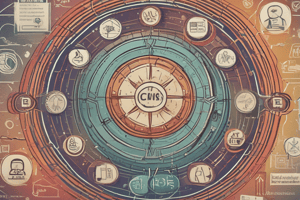Podcast
Questions and Answers
What did Dr. Joe Dispenza discuss in the previous episode?
What did Dr. Joe Dispenza discuss in the previous episode?
- The science behind how the brain functions (correct)
- The brain's reaction to joy and inspiration
- How to change thoughts and behaviors
- The importance of a positive mindset
What percentage of thoughts are typically the same as the previous day?
What percentage of thoughts are typically the same as the previous day?
- 70%
- 50%
- 40%
- 60% (correct)
In what state does Dr. Joe Dispenza believe we can learn and change?
In what state does Dr. Joe Dispenza believe we can learn and change?
- Only in a state of pain and suffering
- In a state of confusion and doubt
- Only in a state of crisis or betrayal
- In a state of joy and inspiration as well (correct)
What does the text imply about making changes in life?
What does the text imply about making changes in life?
What aspect of life does Dr. Joe Dispenza emphasize when discussing change?
What aspect of life does Dr. Joe Dispenza emphasize when discussing change?
What does Hebb's law state?
What does Hebb's law state?
What influences your personality?
What influences your personality?
What happens when a person decides to change their memorized behaviors?
What happens when a person decides to change their memorized behaviors?
How does the text describe people reaching 35 years old?
How does the text describe people reaching 35 years old?
What can happen if one doesn't use their thoughts to create a vision of the future?
What can happen if one doesn't use their thoughts to create a vision of the future?
Flashcards are hidden until you start studying
Study Notes
The Difficulty of Change
- Many people struggle to change on a deeper level, often requiring a crisis or trauma to motivate them.
- Change can be learned in a state of pain and suffering, or in a state of joy and inspiration.
The Brain and Change
- The brain reacts to change based on a biological model.
- The brain's neurocircuitry, neurochemistry, hormones, and gene expression are influenced by thoughts, actions, and feelings.
The Role of Thoughts in Shaping Destiny
- Thoughts have a significant impact on destiny and future.
- Most people think 60,000 to 70,000 thoughts per day, with 90% of those thoughts being the same as the day before.
- Repeating the same thoughts leads to the same choices, behaviors, experiences, and emotions.
Hebb's Law and Neural Patterns
- Hebb's law states that nerve cells that fire together wire together.
- Repeating the same thoughts and behaviors creates a hardwired neural signature.
The Development of Personality
- Personality is shaped by thoughts, actions, and feelings.
- By age 35, most people's brains have developed a hardwired set of programs that become their identity or personality.
- This leads to a set of memorized behaviors, unconscious emotional reactions, automatic habits, and hardwired attitudes, beliefs, and perceptions.
The Challenge of Changing Habits
- When trying to change, the conscious mind (5%) goes against the subconscious mind (95%).
- Positive thinking may not be enough to overcome ingrained habits and beliefs.
- The brain's memories of the past can influence behavior and make people predictable in their lives.
Studying That Suits You
Use AI to generate personalized quizzes and flashcards to suit your learning preferences.




